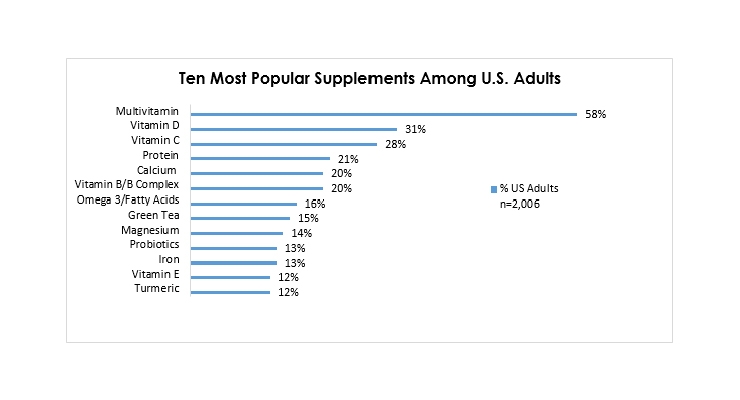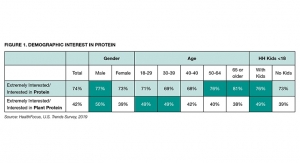09.30.19
More than three-quarters of U.S. adults (77%) report taking dietary supplements, according to the most recent CRN Consumer Survey on Dietary Supplements, which is now in its 20th year.
The majority of both males and females, aged 18+, take supplements, which is in line with previous surveys’ findings, according to the report. Among all the age groups, adults between the ages 35-54 have the highest usage of dietary supplements at 81%.
“While the industry continues to innovate, there is no denying that these regulated products have become mainstream,” said Nancy Weindruch, vice president, communications, Council for Responsible Nutrition (CRN). “More than three quarters of Americans are taking dietary supplements each year—a crystal clear trend that serves as an indicator of the vital role supplementation plays in their overall health and wellness regimens.”
Overall, 77% of U.S. adults take dietary supplements, including:
With respect to the types of supplements being taken, CRN’s 2019 survey found that vitamins & minerals continue to be the most commonly consumed supplement category, with 76% of Americans having taken these products in the past 12 months. The second most popular category is specialty supplements (40%), followed by herbals and botanicals (39%), sports nutrition supplements (28%), and weight management supplements (17%).
Results from the 2019 survey also reaffirmed strong consumer confidence and trust in dietary supplements and the dietary supplement industry, respectively; identified growth in specific categories, such as herbals and botanicals, as well as in specific supplements, such as vitamin C and melatonin; and pinpointed consumers’ key motivators for taking dietary supplements. More on these insights will be released later this year along with other 2019 survey findings, including new statistics on usage of CBD and nootropics, e-commerce habits and delivery form preferences.
“The dietary supplement industry’s success in bringing to market safe, high-quality dietary supplement products that are an increasingly important part of Americans’ self-care regimens is reflected in our survey results,” said Weindruch. “As always, we cannot rest on our laurels. Our survey demonstrates that supplement users have evolving preferences and needs. Brand managers, marketing executives, or anyone looking for additional consumer insights to better understand this dynamic and rapidly growing industry will benefit from investing in the 2019 survey results,” she concluded.
This year, both CRN members and non-members are welcome to purchase the results of the 2019 CRN Consumer Survey on Dietary Supplements. For more information, or to purchase the 2019 survey, contact Holly Vogtman (hvogtman@crnusa.org).
The majority of both males and females, aged 18+, take supplements, which is in line with previous surveys’ findings, according to the report. Among all the age groups, adults between the ages 35-54 have the highest usage of dietary supplements at 81%.
“While the industry continues to innovate, there is no denying that these regulated products have become mainstream,” said Nancy Weindruch, vice president, communications, Council for Responsible Nutrition (CRN). “More than three quarters of Americans are taking dietary supplements each year—a crystal clear trend that serves as an indicator of the vital role supplementation plays in their overall health and wellness regimens.”
Overall, 77% of U.S. adults take dietary supplements, including:
- 79% of female adults
- 74% of male adults
- 70% of adults 18-34
- 81% of adults 35-54
- 79% of adults 55+
- 83% of adults with children under 18 in the household
- 75% of adults without children under 18 in the household
- 81% of adults employed full-time
- 77% of adults employed part-time
- 68% of adults without employment
- 76% of retired adults
- 81% of adults who are married
- 73% of adults who live in the Northeast
- 74% of adults who live in the Midwest
- 80% of adults who live in the South
- 78% of adults who live in the West
With respect to the types of supplements being taken, CRN’s 2019 survey found that vitamins & minerals continue to be the most commonly consumed supplement category, with 76% of Americans having taken these products in the past 12 months. The second most popular category is specialty supplements (40%), followed by herbals and botanicals (39%), sports nutrition supplements (28%), and weight management supplements (17%).
Results from the 2019 survey also reaffirmed strong consumer confidence and trust in dietary supplements and the dietary supplement industry, respectively; identified growth in specific categories, such as herbals and botanicals, as well as in specific supplements, such as vitamin C and melatonin; and pinpointed consumers’ key motivators for taking dietary supplements. More on these insights will be released later this year along with other 2019 survey findings, including new statistics on usage of CBD and nootropics, e-commerce habits and delivery form preferences.
“The dietary supplement industry’s success in bringing to market safe, high-quality dietary supplement products that are an increasingly important part of Americans’ self-care regimens is reflected in our survey results,” said Weindruch. “As always, we cannot rest on our laurels. Our survey demonstrates that supplement users have evolving preferences and needs. Brand managers, marketing executives, or anyone looking for additional consumer insights to better understand this dynamic and rapidly growing industry will benefit from investing in the 2019 survey results,” she concluded.
This year, both CRN members and non-members are welcome to purchase the results of the 2019 CRN Consumer Survey on Dietary Supplements. For more information, or to purchase the 2019 survey, contact Holly Vogtman (hvogtman@crnusa.org).

























